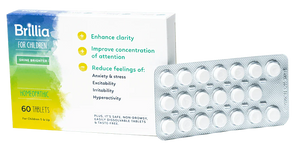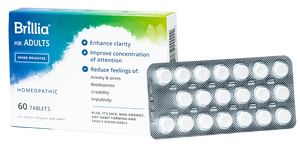The frequency of ADHD diagnoses are rising at an alarming rate across the world, and so is the use of medications and supplements. You may already be familiar with names like Adderall®, Ritalin®, and Vyvanse®, but there are also a number of ADHD supplements like herbal nootropics claiming to enhance cognitive function and help improve memory and focus.
Explore the differences between ADHD supplements and prescription medication, how nootropics compare to drugs like Adderall, and other ways you can better control symptoms like anxiety, inattention, hyperactivity, irritability, and more.
What is the Difference Between ADHD Supplements & Prescription Medication?
When it comes to treating ADHD, many doctors are quick to prescribe medication. This may include stimulant drugs like Adderall and Ritalin or non-stimulant drugs like Strattera® or Wellbutrin®. While these medications are proven to reduce symptoms in many users, they also come with a range of side effects that should be noted, such as sleep problems, decreased appetite, moodiness, and dry mouth. At Brillia, we see the value in prescription medication for ADHD, but we also recommend seeing these drugs as a last resort after other options have been exhausted. This may include supplements.
There are many differences between supplements and prescription medication for ADHD, including:
- Doctor’s approval: Prescription medication must be obtained through a doctor who will also be monitoring the patient during the use of the medication while supplements are available over the counter without a prescription or official diagnosis.
- Purpose: Most prescription medications aim to cure, heal, or reduce symptoms of a particular illness or condition; supplements are typically used to supplement the diet using minerals, vitamins, or other natural biological substances.
- Safety: Prescription drugs are approved by the FDA; before they are released to the public, they must pass clinical tests proving their safety and efficacy. Supplements, on the other hand, are not regulated by the FDA.
What are Nootropics?
Often referred to as “smart drugs,” nootropics refer to natural or synthetic substances that are taken to enhance cognitive function and improve focus, memory, and even motivation. Prescription medications like Adderall and Provigil® are nootropics, and so are non-prescription supplements like panax ginseng and ginkgo biloba. Caffeine is another common nootropic.
One brand of nootropics marketed toward people with ADHD is Thesis, whose products contain substances like functional mushrooms, choline, vitamins, and adaptogens. Thesis sells “personalized nootropic formulas” that claim to deliver a range of benefits from clearing brain fog to enhancing creativity.
Thesis Nootropics vs Adderall
A surge of telemedicine companies during the COVID-19 pandemic was said to contribute to the Adderall shortage that continues to persist in 2023.1 It’s no surprise then that people are searching for Adderall alternatives to ease symptoms like inattention and restlessness.
Enter Thesis. There are a number of differences between Thesis and Adderall, including:
- Ingredients: As stated above, Thesis ingredients consist of substances like functional mushrooms, choline, vitamins, and adaptogens in personalized formulas. Adderall consists of the chemicals Dextroamphetamine sulfate, amphetamine sulfate dextroamphetamine saccharate, and amphetamine (D,L)-aspartate monohydrate. These chemicals bind to norepinephrine and dopamine receptors in the brain in addition to epinephrine receptors in the adrenal gland. This binding effect in Adderall increases the levels of these neurotransmitters, which is said to improve the user’s concentration and alertness.
- Side effects: While many reviewers of Thesis report that the products cause no adverse effects for them, there are some reviewers who cite potential side effects as heartburn, headaches, confusion, dizziness, loss of appetite, and digestive issues.2 Adderall side effects also include headaches, upset stomach, dizziness, and decreased appetite in addition to nervousness, insomnia, and dry mouth.
- Accessibility: To try Adderall, you must obtain a prescription from a doctor. Generic versions are typically covered by insurance, so may cost a minimal amount. Thesis nootropics are available without a prescription and can be ordered through their website. The supplement is not covered by insurance, which can be costly.
ADHD Symptom Control
Though ADHD supplements like Thesis and prescription medication like Adderall can help reduce symptoms of ADHD, it’s important to remember that they are not cures. They only help to manage symptoms, but often at the cost of unwanted side effects. And they are not the only options.
ADHD symptoms can also be managed by lifestyle changes like healthy nutrition, controlled screen time, mindfulness practices, a consistent sleep schedule, and even exercise. Brillia’s holistic approach includes these factors in our 5-Pillar methodology, which helps to set the foundation for self-regulation. Whether you take prescription medication or non-prescription supplements, these lifestyle changes are scientifically-proven to help control your symptoms and minimize their occurrences while you learn to manage them effectively when they do pop up.
How to Know Which Will Work Better for You
At Brillia, we suggest laying the foundation for a healthier lifestyle as an initial approach to managing ADHD symptoms. If your doctor prescribes medication, you may want to ask them if there’s another alternative approach you can try first or have them explain the full range of side effects you can expect. Choosing between medication or supplements is a personal choice and no two people will respond the same, so it’s best to monitor your own symptoms and how your body responds to different substances. But beginning with a gentler approach can help you avoid serious side effects and dependency. While non-prescription Thesis is one possible choice, a homeopathic medication like Brillia is another gentle and effective option.
Supplements, Prescription Medication & Brillia
Brillia is a non-prescription homeopathic medication that works differently from ADHD supplements like Thesis and prescription medications like Adderall and Ritalin. Free from harsh, synthetic chemicals and harmful side effects, Brillia’s active ingredient consists of antibodies to the S100B protein, a key regulator of many different intracellular and extracellular brain processes. By regulating the activity of this protein, Brillia helps to control symptoms associated with ADHD and anxiety without inducing drowsiness, nausea, appetite changes, dependency or masking the personality in any way. Brillia also does not alter blood chemistry, whereas Adderall and other stimulant medications do. This regulating effect also helps to normalize the level of monoamines (dopamine, norepinephrine, serotonin) in different parts of the brain, which are the same neurotransmitters targeted by prescription drugs for ADHD.
Unlike nutritional supplements, Brillia adheres to strict FDA standards and regulations (e.g., for quality, claims and labeling). Active ingredients and inactive ingredients must be submitted for review, along with supporting evidence for claims, in order to be allowed to be sold in the U.S. Because clinical evidence supports Brillia’s safety and claims, it can be taken by children as young as five as well as adults without an official diagnosis or the need to be monitored by a doctor.
Another benefit of taking Brillia is its versatility. Here are three helpful ways you can add it to your regimen:
- To clear up lingering symptoms: Brillia can be used alongside any other medications or supplements without causing harmful interactions to help control lingering symptoms or secondary symptoms such as anxiety, which is commonly caused by prescription medications like Addreall.
- As an alternative: Brillia can be an impactful option for those who are looking for an effective alternative to pharmaceutical products without the negative side effects. Under your doctor’s care and guidance, you can switch over to Brillia once the active ingredient has built up in the system. It’s important that you do not stop taking your medication unless you discuss it with your doctor first to ensure you transition safely.
- To avoid increasing dosage: If a prescription medication is the best option, Brillia can be used to minimize or avoid increasing the dosage of the prescription medications. Brillia can be added to the regimen safely for support, but it does not alleviate the side effects from being on the prescription pharmaceuticals.
And, unlike prescription medication, if you choose to stop using Brillia, the active ingredient will fully exit the system without causing any “coming off” effects.
In addition to reducing symptoms like inattention, hyperactivity, and restlessness, Brillia helps with mood regulation and also enhances focus and clarity, helping you feel more balanced and in control, especially when combined with the behavioral changes listed in the 5-Pillars. Find other ways to help manage your ADHD symptoms at the Brillia(nce) Resource Center.
 A whole bunch of support right in your inbox.
A whole bunch of support right in your inbox.







